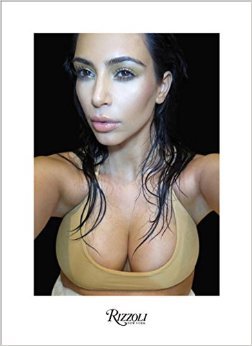The best ever moment on Keeping Up With The Kardashians occurred in Season 8, episode 18. It was filmed days after Kim had given birth to North West; though she and Kanye weren’t planning to involve North in the show, and her birth wasn’t filmed, Kim had an important message she wanted to convey to her public, and so Khloe visited her house to film a short catch-up scene. The baby, Kim established quickly, was all well and good, but more importantly? “When I came back from the hospital, the first thing I did was go and look at my vagina in the mirror,” she assured her little sister. “It looks better looking than before!”
Why is this the best ever Kim Kardashian moment? Because it’s emblematic of everything she is: somehow a gigantic overshare and a manicured, masterful edit. Remember the belfie that went explosively viral four months after Kim gave birth? It was one of many, carefully selected, Instagrammed as an exclusive re-introduction to the world after weeks of dramatic body transformation.
In the same spirit, Kim’s own vagina monologue was her way of making her audience feel like they knew her at the same time as making sure that the “her” they know is one that’s strictly controlled and to an extent created by her. It’s the kind of thing your best friend might say to make you spit out your tea with laughter; in the mouth of Kim Kardashian, the woman whose body the media thinks it owns, the woman who had – at that point – just endured months of torment over her changing body shape while pregnant, it was a colossal power move. As she told Khloe in that 2013 scene, the media and public had “called me a whale, Shamu, a cow…” With her captive audience of approximately three million, she’s the one who gets to take control of the narrative of her own body; in her own words, “fuck you! I look so hot! I am back.”
For any woman in the public eye, being able to tell your own story is an immensely valuable position. For Kim Kardashian especially – someone who was a victim of a very public breach of trust with a sexual partner so early in her rise to fame – it’s radical. No matter how much her fame grows, her ex-lover’s attack on her integrity never disappears; nasty memes about her sex tape still appear today. Even eight years later, a pretty shocking amount of the public think they can demean Kardashian’s worth because she was once filmed enjoying sex with her partner.
In his recent book on the effects of public shaming, Jon Ronson writes that “our shame worthiness lies in the space between who we are and how we present ourselves to the world.” His suggestion is that in a world where we were all radically honest with ourselves and the people around us, it would be impossible to shame us. Kim not only manages to infuse her public persona with such radical honesty and openness (down to how she looks in a swimsuit and how she feels about her vagina after giving birth), but manages to consistently also maintain a kind of illusion; some kind of intrigue that keeps her audiences tuning in, clicking Like and Add to Basket time and time again. In a social media-obsessed world that thrives on intimacy and candid moments, being a celebrity in 2015 requires you to play this game. Kim Kardashian does it better than anyone else in the world, and her recently published Rizzoli coffee table book Selfish is her checkmate.
The lush, 445-page hardback book of selfies is everything Kim herself is: over-familiar, in its faux-handwriting typeface, and its flippant use of “lol” and “fave” and hashtags as if the photos were for Twitter or WhatsApp rather than a mass-produced coffee table book. Skilfully edited, in its omission of anything Kardashian would presumably rather not dwell on (her first two marriages, and her pregnancy during which her weight gain was cruelly lampooned by the press). Un-shameable, in its inclusion of 40 black pages of once-private, mostly naked portraits.
“Kardashian may not be a perfect feminist, but that’s not something we should be concerned about”
The black section of the book is its biggest statement. Among the fleshy, lip-biting, bra-tugging shots, she writes nonchalantly, “I wasn’t intending to put these in the book but saw them online during the iCloud hack. I’m not mad at them. lol.” It’s the most brazen “lol” ever typed, from the fingertips of a woman who has had her sex tape spread online, been victimised and misrepresented in the press again and again (a big storyline on KUWTK in 2011 was her horror at having her nipples shown on the front cover of W magazine after being assured they wouldn’t be), and had her private nude photos – taken for her husband – leaked online for the world to see. Society wants her to quietly accept these violations and be forced out of the public eye. Instead, she has become the most visible person in the world. (Judging by last year’s Paper cover, she’s no longer embarrassed about putting her naked body on a magazine; it’s already happened once, so this time, she simply took control.) Instead, she publishes the very images that are supposed to shame her in her own book, and next to them she writes “lol.” It may as well be a ¯\ (ツ)/¯.
On Jimmy Kimmel Live earlier this year, during an interview to promote the book, Kim elaborated on how the photos also helped her assert a sense of self-worth in the face of the media’s obscene criticism of her pregnant body, and its scrutiny of her post-pregnancy weight. Nude selfies, she told him “taught me to be a little easier on myself,” adding, “There’s some from right after I had my daughter…I was really feeling myself, I was really feeling back in shape, so I took some lingerie selfies.”
The ghosts of tabloid counter-narratives of Kim Kardashian hang over this entire book – in a way, forming the very reason for its existence. How does a person tell their own story when there are so many clamouring to tell it for them? Or, as Kim puts it on page 354, “How many pics does it take to get the perfect selfie?” That question is the beating heart of this book: because what other reason is there to keep turning the pages of self-portrait after self-portrait of a woman you have never met? To see her face represented again and again from minutely different angles, with different shades of foundation, slightly differing amounts of tension around the lips? On pages 228 – 231 she shows the bare bones of the contouring make-up on her face, before it’s blended into the public face she wears. On several pages throughout the book, she snaps herself being worked on by multiple peripheral figures, not shying away from letting you catch a fleeting glance of the intensive work that goes into maintaining an image like hers. Letting you feel closer to her, at the same time as she makes you feel further away.
That private quest for total happiness with her self-image is the story of Selfish. Kim might come out of it with a lot of “self-”s attached to her – self-obsessed, self-centred, self-incriminating, selfish – but most undeniably, she’s self-aware. After the publication of the book, the Telegraph named her a “feminist artist,” with poet and critic Sam Riviere observing “Kardashian’s genuine achievement may be that she has become a singularly successful producer and owner of her own image, and her image alone.” While Selfish perpetuates harmful beauty ideals, unhealthy narcissism and a grotesque, unquestioning love of celebrity and wealth, Kim’s crime is that she’s complicit in a system; that doesn’t make her the sole enforcer of it. She may not be a perfect feminist – as bell hooks accused Beyonce of not being, on the basis that her Time magazine cover (in underwear and a see-through t-shirt) was “not a liberatory image.” But, as Bad Feminist Roxane Gay brilliantly wrote in response “If Beyoncé is, as bell hooks suggests, colluding in the exploitation of her own labor, it’s unclear who Hooks believes controls the means of production.”
Kardashian may not be a perfect feminist, but that’s not something we should be concerned about; she’s not the liberationist who is going to smash the patriarchy. She’s a woman who controls the production of her own image in a world that consistently tries to steal that right from her. That’s unequivocally empowering.
Kardashian has cracked the code of how to be private in public. Particularly as a woman, and a woman whose body has been violated by millions of eyes, she is someone for whom this is an important triumph: she stands before a world that wants to see every detail of her, and to demean and devalue her by doing so, and somehow manages to cash in on the former while putting off the latter. If you just started taking Kim Kardashian seriously, the shame is all on you. She gets what it means to live out her privacy publicly in the digital age better than anyone else in the world; watch that scene where she talks about her vagina again and say it’s any different. She looks in the mirror and we pay to hear about we she saw. She takes her own photograph thousands of times, and despite our 24 hour access to her perfect Instagram feed, we pay just to glimpse a little more.

Selfish is out now, published by Rizzoli


